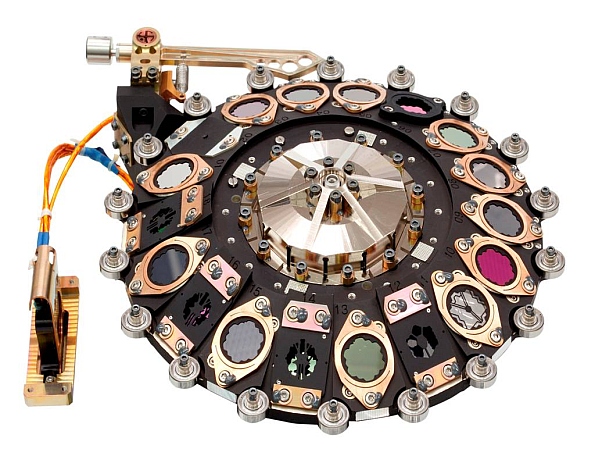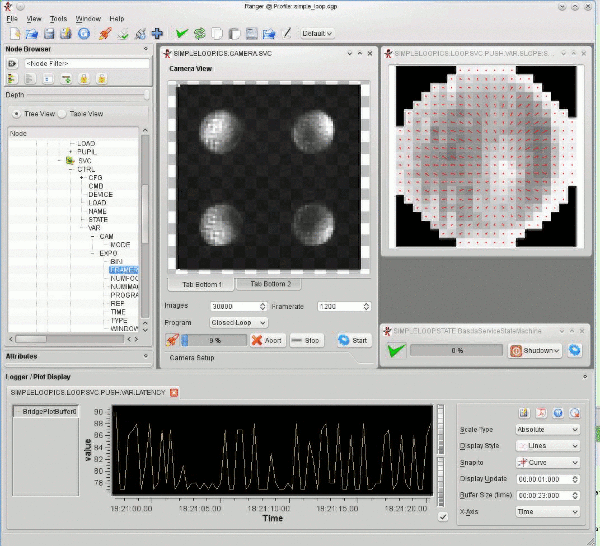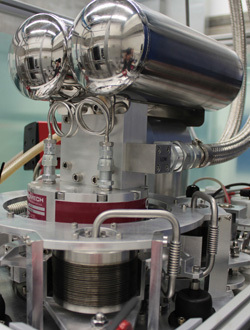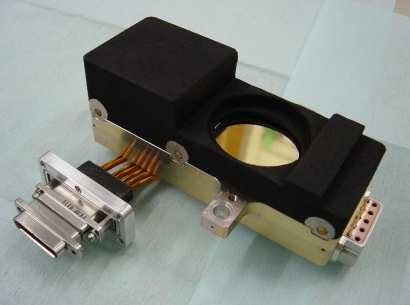| Version 535 (modified by , 2 years ago) (diff) |
|---|
The AstroTechTalk (ger) offers a place to discuss, for all interested colleagues and especially for the technical departments, the project leaders, the administration and the scientists as the ultimately users:
- status of instrumentation projects
- scientific tasks and features of the instruments in construction or planned
- new possible involvements
- technical innovations and developments
- technical problems and their solutions
- logistical problems and their solutions
- how to improve operation and observation
- project standards.
New Time: Always Mondays 15:00 - 16:00
Location: Hybrid -> MPIA Hoersaal + Video-Link
Outline:
- Announcements (news, visitors, etc.) (mainly in German)
- Talk of about 30 min about a selected topic (German or English, will be announced)
- Follow up discussion and questions (German or English, depending on the speaker)
Proposals for talks: Please send an email to "huber -at- mpia.de" or "naranjo -at- mpia.de" - alternatively you might reach us by phone (06221-528331 or -290) or in person (room 111 or 018) at MPIA.
| Date | Speaker | Topic |
| 21.02.2022 | Martin Kürster | MPIA Project Overview This talk will provide an overview of the ongoing astronomical instrumentation projects of the MPIA. It presents * which work packages the MPIA has taken over within the respective consortium which collaborates in development and construction, * the current phase of each project and the overall schedule, * the main characteristics of the instruments, such as type, wavelength, resolution, field-of-view, etc. A brief look at the science planned with each instrument rounds off the presentation. Presentation: German Slides: English Questions: German, English |
| 28.02.2022 | -- | -- |
| 07.03.2022 | Wolfgang Brandner & Wolfgang Gässler | ANDES - more than a mint chocolate Searching for the word ANDES in the internet one of the first products one can find is a mint chocolate. More than 120 astronomers and engineers worldwide are about to change this. They are working on ANDES the ArmazoNes high Dispersion Echelle Spectrograph for the E-ELT, which will cover the wavelength range from the U-band to the near infrared providing precision data to understand exoplanet atmospheres in detail or measure the evolution of fundamental constants (Feinstrukturkonstante) back to the beginning of the universe. The ANDES instrument will consist of a front end including an adaptive optics system, which is picking up the light in the focal plane. Some fiber feed to three spectrographs - UBV, RI, YJH band - and an optional fourth spectrograph for K-band, where our institute with the APEx-department is most interested in. Therefore, we lead a Phase B study of this K-band spectrograph. Transmission spectroscopy is defining the requirements of the K-band spectrograph for us. Other important constraints are the size (volume) and mass, and the highest possible optical throughput. The decision on whether or not to proceed with the K-band spectrograph will happen after the completion of the current Phase B study of the ANDES instrument sometime in 2024. Hopefully it will not end like in Monty Pythons 'Meaning of life' after just one more mint. Presentation: German Slides: English Questions: German, English |
| 14.03.2022 | -- | -- |
| 21.03.2022 | Markus Feldt | SPHERE+ Since 2015, SPHERE has been providing regular data and has not only enabled the consortium of manufacturers to produce well over 100 publications, but has also actually delivered transformative discoveries in the field of exoplanets and planet-forming disks. In one respect, however, its success has been limited: The instrument, which was conceived as a "planet hunter", has found planets, but the ultimate success has - foreseeably - failed to materialise, despite an enormous amount of observation time. However, 6 years of experience provided valuable information about the limiting factors, which have now been reliably identified, as well as possible remedies. This gave rise to the idea of a "SPHERE+" upgrade - an improvement in spectral resolution, as well as an upgrade of the XAO system with a second stage. Presentation: German Slides: English Questions: German, English |
| 28.03.2022 | -- | -- |
| 04.04.2022 | Andreas Bichler (OptoSigma) | OptoSigma - From University partner to space explorer OptoSigma (jap.: SigmaKoki) is a global leader in developing and manufacturing high-quality photonic components. Started 45 years ago, as a flexible and price efficient partner of Japanese universities, OptoSigma developed as global player in photonics and laser industries. Over many decades, OptoSigma collected also a lot of astronomic experiences, which result in February 2021 in the SuperCam of the Mars Rover Perseverance. Presentation: German Slides: English Questions: German, English |
| 11.04.2022 | -- | -- |
| 18.04.2022 | Holiday | Easter Monday |
| 25.04.2022 | André Boné | Tolerance studies for the Relay Optics of MICADO MICADO is the Multi-AO Imaging Camera for Deep Observations, a first light instrument for the Extremely Large Telescope (ELT). MICADO can operate in a stand-alone mode where the ELT focal plane is reimaged to the MICADO focal plane via the relay optics (RO). This subsystem consists of an optical bench made of carbon fiber reinforced plastic, the MICADO calibration assembly, a cover to protect all opto-mechanical components on top of the bench, and an optical assembly. André Boné will present the optical design of the MICADO relay optics, and its tolerance analysis. These tolerances affect the WFE, the exit pupil quality, and optical distortion. The considered effects are alignment (internal and external), optical manufacturing tolerances, and mechanical effects such as mount-induced aberrations, warping of the supporting bench, and the thermal behavior of the subsystem. We will look into how these analyses are performed, and walk through some pros and cons of solutions that bring the system into compliancy. Presentation: English Slides: English Questions: English |
| 02.05.2022 | -- | -- |
| 09.05.2022 | -- | -- |
| 16.05.2022 | -- | -- |
| 23.05.2022 | Aline Dinkelaker (AIP) | Astrophotonics: Bringing Integrated Photonic Components to the Telescope Anlogous to electronics, photonics is a technology, based on photons interacting with matter, that has become a game-changer around the globe. Waveguides in optical fibers and photonic integrated circuits (PIC) have become an immensely successful innovation. Photonic components offer enormous potential for astronomical instrumentation, as they can reduce the amount of bulky, heavy free-space optics and pave the way for innovative solutions. Such astrophotonic devices are already integrated in high-end instruments, leading to groundbreaking discoveries, e.g. the study of the supermassive Black Hole in our Milky Way using GRAVITY at the VLT (Nobel Prize for Physics 2020). With the ongoing development of novel manufacturing methods and designs, the field of astrophotonics continues to grow. At the innovation center innoFSPEC Potsdam, photonic solutions are developed for applications along the signal chain of optical/NIR telescopes, e.g. fiber-based OH-suppression filters (potentially for ELT-MOS/MOSAIC), frequency combs (for STELLA), a PIC-based spectrograph (PAWS), or interferometric beam combiners, also based on PIC (for CHARA). After design, manufacture, and initial laboratory characterization, such components are being prepared for on-sky tests, to validate them for use in real instruments. I will give a brief overview of the astrophotonic research activities at AIP and highlight our current work on beam combiners for stellar interferometry. Presentation: German Slides: English Questions: German, English |
| 30.05.2022 | -- | -- |
| 06.06.2022 | Holiday | Whit Monday |
| 13.06.2022 | Caroline Kulcsar (Institut d'Optique Graduate School) | TBD |
| 20.06.2022 | Armin Böhm | The new fine mechanical Workshop (with guided tour) |
| 27.06.2022 | -- | Institute meeting |
| 04.07.2022 | Natalie Fischer | Workshop program at the HdA |
| 11.07.2022 | -- | -- |
| 18.07.2022 | Vianak Naranjo | HAWAII-4K Detector for PANIC |
| 25.07.2022 | -- | -- |
Preview:
DD.MM.2022 - Speaker: Title
TBD 2022: Ulf Seemann (ESO): Calibration Work
26.09.2022 - Andreas Müller: Sterne und Weltraum (TBD)
Dez 2022 - Manon Lallement: Photonic technology developments for the visible interferometer FIRST at the Subaru Telescope
Postview:
Presentations from 12.09. - 31.12.2014
Presentations from 01.01. - 31.07.2015
Presentations from 01.08. - 31.12.2015
Presentations from 01.01. - 31.07.2016
Presentations from 01.08. - 31.12.2016
Presentations from 01.01. - 31.07.2017
Presentations from 01.08. - 31.12.2017
Presentations from 01.01. - 31.07.2018
Presentations from 01.08. - 31.12.2018
Presentations from 01.01. - 31.07.2019
Presentations from 01.08. - 31.12.2019
Presentations from 01.01. - 31.07.2020
Attachments (11)
- instrum8_gr.jpg (82.6 KB) - added by 10 years ago.
- instrum4_gr.jpg (104.4 KB) - added by 10 years ago.
- pedv3_gr.jpg (213.9 KB) - added by 10 years ago.
- alfa3.5.gif (235.6 KB) - added by 10 years ago.
- CIAO.jpg (3.8 MB) - added by 8 years ago.
- linc_nirvana_labor.jpg (255.2 KB) - added by 8 years ago.
- MATISSE.jpg (43.1 KB) - added by 8 years ago.
- miri_fm_filterwheel.jpg (145.6 KB) - added by 8 years ago.
- PACS-Chopper.jpg (80.0 KB) - added by 8 years ago.
- simple_loop.gif (965.4 KB) - added by 8 years ago.
- teaser.jpg (13.5 KB) - added by 8 years ago.
Download all attachments as: .zip







